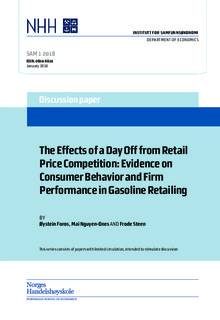The Effects of a Day Off from Retail Price Competition: Evidence on Consumer Behavior and Firm Performance in Gasoline Retailing.
Working paper

Åpne
Permanent lenke
http://hdl.handle.net/11250/2478229Utgivelsesdato
2018-01Metadata
Vis full innførselSamlinger
- Discussion papers (SAM) [657]
Sammendrag
First, we analyze how regular days off from competition and a time-dependent price pattern affect firm performance. Second, we examine the effects on firms' profitability from consumers’ changing search- and timing behavior. We use microdata from gasoline retailing in Norway. Since 2004, firms have practiced an industry-wide day off from competition, starting on Mondays at noon, by increasing prices to a common level given by the recommended prices (decided and published in advance). In turn, a foreseeable low-price window is open before every restoration. During the data period, we observe an additional weekly restoration on Thursdays at noon. The additional day off from competition increases firm performance. As expected, a conventional price search of where to buy reduces firms’ profitability. In contrast, consumers who are aware of the cycle and spend effort on when to buy have a positive impact on firms’ profitability. If consumers spend effort on when to buy, they attempt to tank during low price windows. By its very nature, this shrink consumers’ ability to compare prices at several outlets. Consequently, more attention to when to buy may soften price competition.